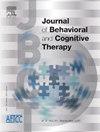The effects of exercise intervention for restricted and repetitive behavior in children with autism spectrum disorder: A network meta-analysis
IF 1.6
Q3 PSYCHIATRY
引用次数: 0
Abstract
Objective
To compare the relative effects of different interventions on repetitive stereotyped behaviors in children with autism spectrum disorders, and to compare the roles of different interventions, to provide an evidence-based basis for developing effective Exercise prescription.
Methods
Literature from domestic and international databases such as Cochrane Library, PubMed, Web of Science, MEDLINE, PsycINFO, Embase, China Knowledge, Baidu Academic, and Wanfang was searched. The search encompassed the period from the inception of the database to July 21, 2024, with analysis conducted using RevMan 5.3 and Stata 15.0.
Results
A total of 10 studies were included in the analysis. Meta-regression analyses revealed that exercise interventions can effectively ameliorate repetitive and stereotyped behaviors in children with Autism Spectrum Disorder (ASD). Further subgroup analyses demonstrated significant differences in the effects of these interventions based on varying intervention cycles and the ages of the participants. To delve deeper into the impact of different interventions, reticulated Meta-analyses were conducted. The results indicated that ball games (SMD = −5.35 [-6.92, −3.77]), karate training (SMD = −0.93 [-1.68, −0.17]), and bicycle riding (SMD = −0.97 [-1.90, −0.04]) interventions played a significant role in reducing repetitive and stereotyped behaviors in children with ASD. Additionally, the cumulative probability ranking (SUCRA) results suggested that ball games may be the most effective means of improving these behaviors in children with ASD (SUCRA = 79).
Conclusion
Ball games showed the highest SUCRA ranking (79 %), but their clinical application is limited by significant heterogeneity (I2 = 78 %), small sample size (10 RCTs, n = 245), and tool-specific effects (SMD = -4.2 in RBS-R vs. −1.1 in GARS-2). Subgroup analyses highlighted age (5–8 years) and duration (>9 weeks) as critical factors. Additionally, potential biases (e.g., unclear allocation concealment in 30 % of studies) and the need for larger, multi-center trials should be noted. Sports interventions may be optimized by combining ball games with karate or cycling.
运动干预对自闭症谱系障碍儿童限制性和重复性行为的影响:网络荟萃分析
目的比较不同干预措施对自闭症谱系障碍儿童重复性刻板行为的相对影响,并比较不同干预措施的作用,为制定有效的运动处方提供循证依据。方法检索Cochrane Library、PubMed、Web of Science、MEDLINE、PsycINFO、Embase、China Knowledge、百度Academic、万方等国内外数据库的文献。搜索涵盖了从数据库建立到2024年7月21日的这段时间,使用RevMan 5.3和Stata 15.0进行分析。结果共纳入10项研究。荟萃回归分析显示,运动干预可以有效改善自闭症谱系障碍(ASD)儿童的重复和刻板行为。进一步的亚组分析表明,基于不同的干预周期和参与者的年龄,这些干预措施的效果存在显著差异。为了更深入地研究不同干预措施的影响,我们进行了网状元分析。结果表明,球类运动(SMD = - 5.35[-6.92, - 3.77])、空手道训练(SMD = - 0.93[-1.68, - 0.17])和骑自行车(SMD = - 0.97[-1.90, - 0.04])干预对减少ASD儿童的重复和刻板行为有显著作用。此外,累积概率排序(SUCRA)结果表明球类运动可能是改善ASD儿童这些行为的最有效手段(SUCRA = 79)。结论球类运动具有最高的SUCRA排名(79%),但其临床应用受到显著异质性(I2 = 78%)、小样本量(10个rct, n = 245)和工具特异性效应(RBS-R的SMD = -4.2 vs. gar -2的SMD = - 1.1)的限制。亚组分析强调年龄(5-8岁)和病程(>;9周)是关键因素。此外,应该注意潜在的偏倚(例如,30%的研究中不明确的分配隐藏)和需要更大规模的多中心试验。通过将球类运动与空手道或自行车运动相结合,可以优化运动干预。
本文章由计算机程序翻译,如有差异,请以英文原文为准。
求助全文
约1分钟内获得全文
求助全文
来源期刊

Journal of Behavioral and Cognitive Therapy
Psychology-Clinical Psychology
CiteScore
3.30
自引率
0.00%
发文量
38
审稿时长
60 days
 求助内容:
求助内容: 应助结果提醒方式:
应助结果提醒方式:


